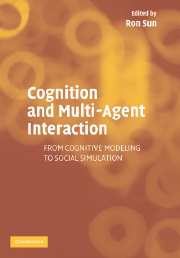Book contents
- Frontmatter
- Contents
- List of Contributors
- Preface
- PART 1 INTRODUCTION
- PART 2 OVERVIEWS OF COGNITIVE ARCHITECTURES
- PART 3 MODELING AND SIMULATING COGNITIVE AND SOCIAL PROCESSES
- PART 4 A SYMPOSIUM
- 15 Cognitive Science and Good Social Science
- 16 Collective Cognition and Emergence in Multi-Agent Systems
- 17 Social Judgment in Multi-Agent Systems
- 18 Including Human Variability in a Cognitive Architecture to Improve Team Simulation
- 19 When Does Social Simulation Need Cognitive Models?
- Index
19 - When Does Social Simulation Need Cognitive Models?
Published online by Cambridge University Press: 15 December 2009
- Frontmatter
- Contents
- List of Contributors
- Preface
- PART 1 INTRODUCTION
- PART 2 OVERVIEWS OF COGNITIVE ARCHITECTURES
- PART 3 MODELING AND SIMULATING COGNITIVE AND SOCIAL PROCESSES
- PART 4 A SYMPOSIUM
- 15 Cognitive Science and Good Social Science
- 16 Collective Cognition and Emergence in Multi-Agent Systems
- 17 Social Judgment in Multi-Agent Systems
- 18 Including Human Variability in a Cognitive Architecture to Improve Team Simulation
- 19 When Does Social Simulation Need Cognitive Models?
- Index
Summary
Contributors to this volume have explored the ways in which cognitive models or architectures may be helpful or even essential for building simulations. In this epilogue, I shall be considering whether cognitive models are always necessary – is a social simulation necessarily inadequate if it has no or only a very simple model of cognition? If not, is it possible to specify classes of simulations for which cognitive models are necessary or unnecessary?
I begin by rehearsing the issue of “levels,” which has been touched on by a number of contributors, suggesting that analytically at least it is possible to distinguish a biological, a cognitive and a social level, in which the characteristics of phenomena at one level are emergent from the behavior of phenomena at levels below (see Chapter 1). This leads to a consideration of when social models need to take account of the details of cognitive architectures (and when cognitive architectures need to take account of social phenomena). Finally, I discuss the problem of how to select among the cognitive architectures being offered when it has been decided that one does need to include a cognitive model in one's social simulation.
The idea of “levels” is quite difficult to pin down, although commonplace not only in the social simulation community but also more generally in science. It expresses the idea that small-scale details can be abstracted away when considering phenomena at a more macroscopic scale (Gilbert, 1995). For example, to understand the behavior of ordinary physical objects, you do not need to know about the composition of atoms; similarly to understand ecology, you do not need to be familiar with intra-cellular processes.
Information
- Type
- Chapter
- Information
- Cognition and Multi-Agent InteractionFrom Cognitive Modeling to Social Simulation, pp. 428 - 432Publisher: Cambridge University PressPrint publication year: 2005
Accessibility standard: Unknown
Why this information is here
This section outlines the accessibility features of this content - including support for screen readers, full keyboard navigation and high-contrast display options. This may not be relevant for you.Accessibility Information
- 10
- Cited by
